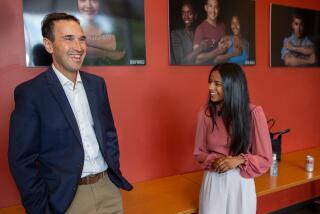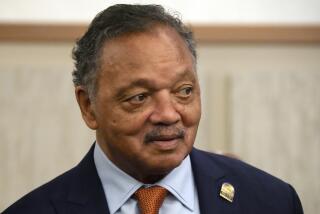New Emanuel on U.S. stage
He’s the eldest brother, a doctor and a scholar with a resume the size of a small book. Brothers Ari and Rahm are celebrities, but he’s the one they think could someday win the Nobel Prize.
Now Ezekiel Emanuel has become something of a public figure as he tries to help the Obama administration overhaul America’s healthcare system.
It’s an enormously difficult task, given the nation’s economic problems. And while Zeke, as everyone calls him, has impressive medical and policy credentials -- not to mention the ear of Rahm, the president’s chief of staff, with whom he talks every day -- he has never been part of a political team or toed a party line. The changes he has championed -- to give all Americans insurance vouchers and get rid of the employer-based healthcare coverage -- bear little resemblance to those embraced by the president.
That doesn’t bother the 51-year-old Emanuel. As special advisor to Peter R. Orszag, director of the Office of Management and Budget, he is at the table with a small circle of trusted insiders crafting healthcare policy. And as the top physician in the group, he knows how policy proposals can affect providers on the front lines of medicine -- a perspective lacking during the healthcare debate in the Clinton presidency.
Publicly, Emanuel’s role is to make the case for change while reassuring medical professionals that it won’t constitute an unwelcome upheaval.
“You are not going to flip a switch and change our system,” he said in a recent interview. “It’s got to be an evolution, not a revolution.”
In his new role, “Zeke will absolutely speak his mind,” predicted Thomas Murray, president of the Hastings Center, a bioethics think tank. “He will be able to ask the hard questions and be a powerful intellectual force for ensuring the integrity of proposals that are put forward.”
As a child, Zeke was a self-described “goody two-shoes” who brought home top grades and was a hard-to-follow act for his brothers. That hasn’t hampered their success: Rahm is the president’s right-hand man, and Ari, the youngest, is a high-powered Hollywood agent -- the model for the character Ari Gold on “Entourage.”
From Zeke’s perspective, the Emanuel boys inherited a “goal-directed, hyperkinetic quality” and “a lack of respect for authority” from their father, an Israeli immigrant and a pediatrician. From their mother, the brothers acquired a feeling that they could try anything they wanted, fail, and still be supported.
“My parents had very high standards, and no achievement got enormous, over-the-top celebration,” Emanuel said. “It was like: ‘That’s great; what are you going to do next?’ ”
On weekends the boys often would tag along with their maternal grandfather, a union organizer, or their father, who was seeing patients. In 1966, they marched with their mother and civil rights activists, an experience Zeke Emanuel describes as “searing.”
“The ethos of the family was: Do something to make the world a better place,” he said. Also, as in many immigrant families, there was a sense that they had to stick together -- something the Emanuel brothers do to this day.
While at Harvard, Zeke Emanuel decided to pursue a doctorate in political philosophy along with a medical degree, and became fascinated by bioethics.
“He has an unusual combination of interests, bringing together politics, medicine and health, and a remarkable capacity to do many demanding jobs at once,” said Michael Sandel, a Harvard government professor who was Emanuel’s dissertation advisor.
The founding chief of the bioethics division at the National Institutes of Health, Emanuel was unfamiliar to many advocates of overhauling the healthcare system when he joined the White House team late last year.
Some were put off by proposals in a book he had written, including a plan to scrap Medicare, Medicaid and employer-based health insurance in favor of vouchers that people could use to purchase coverage.
“It’s very unrealistic,” said Diane Archer, who co-directs the healthcare project at the Institute for America’s Future, a liberal Washington think tank.
Others wonder whether Emanuel is prepared to be a team player. “At NIH, he was able to be somewhat of a loose cannon, saying pretty much what was on his mind,” said Gerard Anderson, director of the Johns Hopkins Center for Hospital Finance and Management.
Emanuel’s occasional collaborator, economist Victor Fuchs of Stanford University, questions the wisdom of a healthcare overhaul amid the economic downturn. “If I were one on one with the president, I would say there are other issues that deserve more focus -- the economy, the Afghanistan situation,” Fuchs said.
Many players in the health overhaul debate are curious about Emanuel’s responsibilities, which are not well-defined.
“We’ll be working cooperatively as much as possible, but I expect that Zeke will be a point of contact for physicians and researchers,” said Nancy-Ann DeParle, director of the White House Office for Health Reform. “In-house, he’s an incredibly valuable resource for helping to think through problems and approaches. . . . He brings the kind of passion and drive we’re going to need to get this job done.”
At a recent gathering of the American Medical Assn. in Washington, Emanuel sounded the theme that physicians needed to be involved in changing the healthcare system.
“If we don’t get health reform, we surely all will lose,” he told a group of doctors. “Tell us what you are going to contribute.”
In an interview later, Emanuel acknowledged that he may be uniquely positioned to deliver that message. “I can say things that other people may not be able to,” he said.
“It’s the perspective of having been in the trenches, having had to negotiate with insurance companies and doctors and patients and trying to get services,” he said. “I think I understand the actual mechanics out there better than an economist or a health policy expert who has studied it from afar.”
--
noam.levey@latimes.com
More to Read
Start your day right
Sign up for Essential California for news, features and recommendations from the L.A. Times and beyond in your inbox six days a week.
You may occasionally receive promotional content from the Los Angeles Times.







